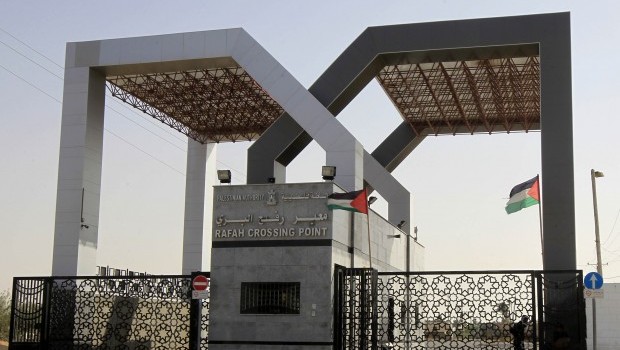
Palestinian flags flutter at the closed gate of the Rafah crossing with Egypt in the southern Gaza Strip on May 17, 2013. (AFP Photo/Said Khatib)
Cairo/Gaza, Asharq Al-Awsat—North Sinai security chief Gen. Samih Beshadi said yesterday that all options are now open in dealing with the kidnappers of the seven Egyptian soldiers. This comes in conjunction with the continuing closure of the Rafah Crossing with Gaza by Egyptian soldiers.
Sources within the Egyptian president’s office told Asharq Al-Awsat that President Mohamed Mursi has given instructions to speedily resolve the issue. The closure of the border crossing—Gaza’s only access to the outside world, which had enjoyed a relaxation of movement restrictions since the 2011 revolution in Egypt—has cast a shadow over relations between Cairo and Gaza.
Late last night, North Sinai security sources, as well as Palestinian sources, said efforts by both sides to reopen the crossing had failed. An Egyptian official said negotiations with the kidnappers had “failed to secure the release of the soldiers” and that the “patience of army and police forces in Sinai ias running out,” pointing out that the Egyptian authorities “may resort to force to release the soldiers.” Beshadi said all options are now on the table to deal with the kidnappers.
The sources added that President Mursi has given instructions to proceed cautiously and without bloodshed, and that negotiations could lead to a resolution, while force may complicate matters further.
A security official announced that police and army officers have completed preparation of plans that are to be implemented if negotiations falter, but that there was still hope of ending the crisis without violence in accordance with President Mursi’s instructions.
General Sayyed Abdul Fattah Harhour, governor of North Sinai, said he had received a telephone call from President Mursi asking him to follow up developments in the crisis and the efforts made to secure their release. The governor pointed out that negotiations are ongoing, and that major figures in Sinai are helping security forces to persuade the kidnappers to release the soldiers. He added that he hoped the crisis would be resolved as soon as possible, and that the soldiers would return to their units.
Sources at Al-Arish Airport in Sinai said the airport was closed when security officers refused to work, in solidarity with their colleagues at the Rafah Crossing Border Security Department. Officials at the airport, however, said the closure was due to maintenance work.
On the Palestinian side, Gaza government Interior Ministry spokesman Islam Shahwan said, “Hundreds of stranded Palestinians, including Legislative Council deputies, sick people, and pilgrims returning from Mecca, were subjected to insults by Egyptian police.”
Shahwan said in a statement published on Facebook that “I was contacted by a number of people who were held hostage and suffered greatly, and were shot at by Egyptian police.” He added that “what happened today to our people at the Rafah Crossing was unacceptable and the government must demand an apology from the Egyptians for the insults directed at women and children and the fear caused by the threats made by Egyptian police.” Shahwan also called on Palestinian factions to make a “joint response to the Egyptian presidency about the insults at the Rafah Crossing.”
Eyewitnesses said hundreds of the stranded were sleeping rough in difficult circumstances, particularly for the many of them who were returning after having surgery abroad, or those who were very old or very young. A security official confirmed that the number of the stranded had risen to 500, adding that this number was expected to rise further.
Ahmad Ghazi, the undersecretary of the Gaza government’s Foreign Ministry, said that “talks were being held at the highest level with Egypt in order to reopen the Rafah Crossing and secure the return of our stranded people, whether they were citizens, deputies or officials.”
In a statement given to journalists, he expressed his hope to resolve the issue of kidnapped soldiers as soon as possible, adding that the government in Gaza “had taken intense measures in the border and the tunnels area in order to contain any security implications.”
Director of the Borders and Crossings Directorate in the Gaza government, Maher Abu-Sabha, said the failure of Egyptian efforts to release the seven kidnapped soldiers in North Sinai meant the continued closure of the Rafah Crossing.
The Gaza government has said Prime Minister Isma’il Haniyyah received a telephone call from President Mursi two nights ago. According to the government statement, Mursi and Haniyyah discussed latest political developments, especially Palestinian reconciliation, as well as security issues.
Gen. Harhour said a number of measures were taken to contain to problem of Palestinians being stranded at the border, and that there was coordination with the border management to build a large tent at the border for Palestinians to use as a shelter.
The governor promised to meet all the needs of stranded Palestinians and provide them with humanitarian care and security. He added that any Palestinian who runs out of money will be provided for by the governorate.
